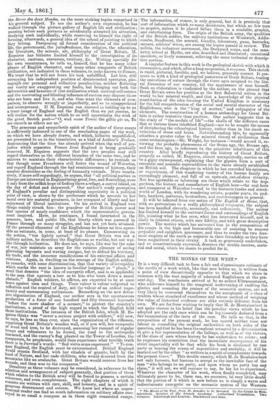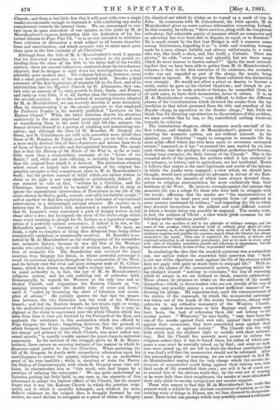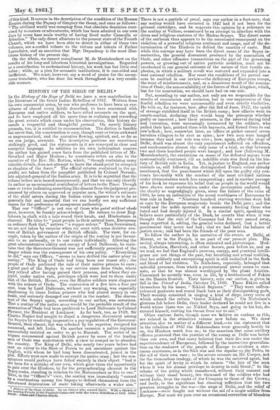THE MONKS OF THE WEST.*
IT is a very difficult task to form a fair and dispassionate estimate of the merits of a work which, like that now before us, is written from a point of view diametrically opposite to that which we share in common with the vast majority of educated Englishmen at the pre- sent day. The conclusions arrived at by an ardent Ultramontanist, who addresses himself to the congenial undertaking of exalting the glories and sounding the praises of the monastic system, are not very likely to commend themselves to the acceptance of a class of readers whose standard of excellence and whose method of weighing; the value of historical evidence are alike entirely different from his own. We are far from wishing to imply that M. de Montalembert is not quite sincere in his belief that the peculiar views which he has adopted are the only ones which can be legitimately deduced from a fair examination of the facts of the case. He tells us that, in the composition of the present work, he has spared neither time nor labour in consulting the original authorities on both sides of the question, and that he has been throughout actuated by a determination to give a fair representation of the failings, as well as of the virtues, of the class of men whose history he has undertaken to relate ; and he expresses his conviction that the immediate consequence of his strict impartiality will be that while his book is disdained by one party as bearing the stamp of superstition and credulity, it will be marked out by the other "as written in a spirit of complacency towards the present times." This double enmity, which M. de Montalembert not only foresees, but hastens to accept as the inevitable fate of the man "who belongs to no party, and upon whom no party has any claim," it will not, we will venture to say, be his lot to experience. Whatever the character of his work, when finally completed, may ultimately prove to be, there can, we conceive, be very little doubt that the portion of it which is now before us is simply a warm and indiscriminate panegyric on the monastic system of the Western • The Monks of the West, from St. Benedkt to St. Bernard. By the Count de Mon- talembert, Member of the French Academy. Authorized Translation. Two volumes. Edinburgh and London: Blackwood and Sons..
former devotes himself to a system of plodding and painstaking nar- The introdnctory chapters, which compose nearly one-half of the ration; and although the lives of St. Benedict, St. Gregory the first volume, and contain M. de Montalembert's general views re- Great, and St. Columbanus are told with somewhat more detail than specting the monastic system, are not without interest. In his those of St. Donates, St. Calais, and St. Fiacre, yet we fail to obtain opinion, every Christian " ought to recognize in monastic life the a more really distinct idea of their characters and actions than we do most noble effort which has ever been made to overcome corrupted of those of their less notable and distinguished brethren. The simple nature," inasmuch as it has "re-created the man wasted by sin into fact is that the History of Ike Monks of the Hrest is, so far at least, such virtue, that the prodigies of evangelical perfection have become, little more than a compendious summary of the "Lives of the during long centuries, the daily history of the Church." This is the Saints ;" and, while not more edifying, is certainly far less amusing, essential merit of the system, the services which it has rendered to than the original from which it is derived. The miraculous element the sciences, to letters, and to agriculture, are but incidental. Hence which enters so larp,ely into the composition of the original bio- it follows that prayer is the most legitimate and useful of the labours graphics occupies a very conspicuous place in M. de Montalembert's in which the monks were engaged ; a view which, we should have work ; but the precise amount of belief which our author wishes to thought, would have predisposed its advocate in favour of the East- claim as its right is not very clearly or satisfactorily defined. At ern monasteries, the inmates of which have always devoted them-
one moment he tells us that, "written by a Christian, and for selves to religious contemplation far more exclusively than their Christians, history would lie to herself if she affected to deny or brethren of the West. He protests strongly against the opinion that
ignore the supernatural intervention of Providence in the life of the monastic life was a refuge for those who were unfit to struggle with saints chosen by God to guide, console, and edify his faithful people ;" the world; affirming that the monks are " the representatives of and at another we find him explaining away instances of supernatural manhood under its most pure and energetic form—of manhood in intervention in a distressingly rational manner. He expects us to some manner condensed by celibacy," and regarding the life to which believe that St. Benedict's look unfastened a captive's bonds, and they devoted themselves as the noblest and most difficult contest that St. Learner's voice restrained a pack of hungry wolves in full in which a human being can possibly be engaged. The monks were, chase after a doe; but he regards the story of the twelve stags which in fact, the soldiers of Christ : a view which gives occasion for the came every morning to plough for St. Leonor as a legendary exagge- following rather ingenious parallel;
ration of a peribctly natural occurrence, if indeed it he not, as the "And as the sacrifice of self is the principle of military courage, and the Bollandists assert, a "travesty of historic truth." We have, we cause of that preatigs which attaches itself to military glory above all other think, a right to complain at being thus debarred from being either human renown, so, in the spiritual order, the daily sacrifice of self by monastic consistently credulou.s or consistently sceptical. St. Benedict is se- accorded to the monk. Thus also is explained the necessity of minute and leeted by M. de Montalembert as the starting-point of' his researches continual subjection in all monastic government, just as we meet in every army into monastic history, because he was the first of the Western with rules of discipline sometimes puerile and vexations in appearance, but the monks who provided a rule, or code of written laws, for the regale- least infraction of which, in time of war, is punished with death.' tion of monastic life. The Benedictine rule received the papal In combating the idea that the monkish existence was a melancholy sanction from Gregory the Great, to whose powerful patronage it one, our author makes the somewhat bold assertion that "there owed its universal adoption throughout the monasteries of the West, is not one of the objections made against the life of the cloister which and its victory over the rival and more stringent code of St. Colum- does not apply with quite as much force to conjugal life." With re- banns, which was drawn up about half a century later. Submission gard to the abuses of the monasterial system, respecting which he to papal authority is, in fact, the key of M. de Montalembert's has pledged himself "nothing to extenuate," the line of reasoning religious system, and his sole unfailing test of orthodox faith. which he adopts is, we are inclined to think, scarcely satisfactory. Consequently, he regards the Western as the only true and or- These abuses he proposes to relate on the authority of the monks thodox Church, and stigmatises the Eastern Church as "re- themselves; which, to those readers who are not already of his way of maining prostrate under the double yoke of error and force," thinking, may possibly appear a somewhat inefficient manner of re- until it "ended by becoming the slave of Islamism and accom- deeming his pledge. He maintains that, until the commencement of plice of schism." He entirely ignores the fact that the sepam- the system of the commende, by which the monasterial patronage tion between the two Churches Was the work of the Western was taken out of the hands of the monks themselves, abuses were branch; and that the Eastern branch, be her tenets right or wrong, unknown in any orthodox monastery of the Western Church. is the undoubted representative of the original faith. He is very in- But no matter how numerous or how flagrant such abuses may dignant at the claim to supremacy over the whole Church which has have been the task of reforming them did not belong. to the been from time to time put forward by the Patriarch of the Bast, and secular power. "Whatever," he says boldly, "may have been the applauds the resistance to this assumption which was offered by sins of the monks against their own rule, against their condition, Pope Gregory the Great ; forgetting, however, that the ground on against their conscience, they have committed none against their which Gregory based his opposition, that- St. Peter, who received fellow-creatures, or against society." The Church was the only
the charge and primacy of the whole Church, was never called uni- body which had the slightest right to meddle with their reformversal apostle," is equally tenable against the papal claim to universal tion. But the Church has scarcely more power to reform the
supremacy. In the account of this struggle given by M. de Monte- religions orders than it has to found them, for either of which pnr- 'embed, there occurs an amusing instance of the manner in which he poses a man must be specially raised up by God- and since no such dispenses equal justice to the two Churches. When-narrating the men were raised up, we are left to draw the obvious conclusion that life of St. Gregory, he dwells with sympathetic admiration upon his it was God's will that the monasteries should not be reformed. After unwillingness to accept the papacy, regarding it as an undoubted this astounding piece of reasoning, we are not surprised to find IL proof of his true humility ; while, in speaking of John the Faster, de Montalembert urging that the only charge which the secular de- the Bishop of Constantinople, with whom St. Gregory came into col- stroyers of monasteries could bring against their victims was, that lision, he characterizes him as "this monk, who had begun by a their mode of life resembled their own ; nor will it be of much use pretence of refusing the episcopate." We can quite understand an to remind him of the obvious truth that, by the very act of ceasing historian putting but little faith, in any case, in the sincerity of this to be more holy than their neighbours, the monks at once abaudoned reluctance to accept the highest offices of the Church, but we cannot their only claim to secular recognition and secular support. forget that it was the Eastern Church in which the practice origi- Those who expect to find that M. de Moutalembert has made the stated, and to which it specially belonged; and, without far more present work a vehicle for any distinct expression of opinioll. as to the definite evidence on the subject than is brought forward by our existing state of things in France, are, we fear, doomed to disappoint- author, we must decline to recognize as a proof of virtue in Gregory ment. There is but one passage which may possibly conceal a reference
Church; and there is but little fear that it will meet with even a shire the identical act which he wishes us to regard as a mark of vice in readerunreasonable enough to reproach it with exhibiting any undue John. In connexion with St. Columbanus, the Irish apostle, M. de complacency towards the present times. We are encouraged to yen- Montalembert gives us some curious information respecting Ireland. tare upon an open statement of our opinion on this pomt by M. de In that country, he tells us, "there survives, along with the completest Montalembert's express declaration that the dedication of his his- orthodoxy, that admirable purity of manners which no conqueror and torical labours to Pope Pius IX. " is in no way intended to withdraw no adversary has ever been able to dispute, to equal, or to diminish." from criticism or discussion a work subject to all human imperfee- He is much struck by the fact that Bridget is still a common name tions and uncertainties, and which assumes only to enter upon ques- among Irishwomen, regarding it as " a noble and touching homage tions open to the free estimate of all Christians." made by a race, always faithful, and always unfortunate, to a saint
Although from the title of M. de Montalembert's work it appears who was, like itself, a slave, and, like itself, a Catholic. There are that his historical researches are to be confined to the period ex- glories," he adds, " more noisy and splendid, but are there many- tending- from the close of the fifth to the latter half of the twelfth which do more honour to human nature ?" Quite the most interest. century, there are several indications, scattered about his introductory ing fact that we have been able to gather from M. de Montalembert's chapters, that he designs to carry down his investigations to a con- volumes is that, in the first centuries of its existence, the monastic- siderably more modem date. The volumes before us, however, cover order was not regarded as part of the clergy, the monks being bat a small portion even of the more limited field. Besides a brief reckoned as laymen. St. Gregory the Great enforced this distinction summary of the first beginnings of mcmastic life in the East, and of its very strongly. He would not allow a priest or deacon to become a introduction into the 'Western Church by St Athanasms, they con- monk, unless he gave up his clerical functions ; and though he per- tain only an account of its early growth in Italy, Spain, and France, mitted monks to be made priests or bishops, he compelled them, in and carry us very little, if at all, further than the commencement of all such cases, to leave their monasteries, never to return. It is, as the seventh century. As to the method of narrating history adopted M. de Montalembert remarks, " very difficult to follow the different by M. de Montalembert, we can scarcely describe it more accurately phases of the transformation which elevated the monks from the lay than by characterizinn. it as the precise opposite to that employed condition to that which procured them the title and standing of the by Professor Stanley m his recently published "Lectures on the Regular dergy,-in opposition to the Secular ckryy ;" but, while we Eastern Church!' While the latter historian directs his attention thank him for directing our attention to the existence of this problem, exclusively to the more important personages and events, and aims we must confess that he has, so far, contribated. nothi 0; whatever at reproducing them in the most vivid and life-like manner, the towards its solution.
obedience explains and justifies the supreme regard which the Church has always
of this kind. It occurs in the description of the condition of the Roman Empire during the Papacy of Gregory the Great, and runs as follows : "The civilized world was escaping from that absolute dominion exer- cised by monsters or adventurers, which has been admired in our own days by some base souls worthy of having lived under Caracalla or Arcadius." The only direct allusions to the present state of the French Church, which we have been able to. detect in either of these two volumes, are a cordial tribute to the virtues and talents of Father Lacordaire, and an assertion that Mgr. Dupanloup is the most illus- trious bishop of the present day. Oft the whole, we cannot compliment M. de Montalembert on the results of his long and laborious historical investigations. Regarded as a contribution to ecclesiastical history, his work has but little real value ; while, as a plea, for monastic institutions, it is one-sided and inefficient. We must; however, say a word of praise for the anony- mous translator, who has done his work throughout in a very credit- able manner.
































 Previous page
Previous page